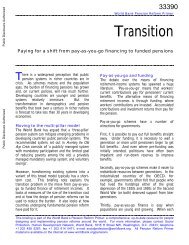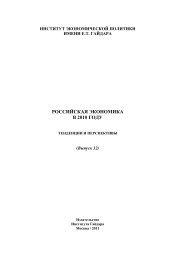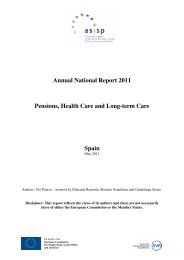Financial Sector Development in Africa: Opportunities ... - World Bank
Financial Sector Development in Africa: Opportunities ... - World Bank
Financial Sector Development in Africa: Opportunities ... - World Bank
Create successful ePaper yourself
Turn your PDF publications into a flip-book with our unique Google optimized e-Paper software.
The Potential of Pro-Market Activism for F<strong>in</strong>ance <strong>in</strong> <strong>Africa</strong>: A Political Economy Perspective 219<br />
<strong>in</strong> rich countries, such as efficient courts, private property rights,<br />
or bankruptcy laws. The key assumption is that the k<strong>in</strong>d of <strong>in</strong>stitutions<br />
reformers should build should be cont<strong>in</strong>gent on the economic constra<strong>in</strong>ts<br />
and political realities of a specific country at a particular stage<br />
of development (Adler, Sage, and Woolock 2009; Gerschenkron 1962;<br />
Rodrik 2008). S<strong>in</strong>ce develop<strong>in</strong>g countries face different constra<strong>in</strong>ts<br />
and different political environments than rich countries, this may<br />
require adopt<strong>in</strong>g better-fitt<strong>in</strong>g second-best <strong>in</strong>stitutions, which differ<br />
from those prevail<strong>in</strong>g <strong>in</strong> rich countries, as a transitional device. Secondbest<br />
<strong>in</strong>stitutions might offer a more pragmatic way forward because<br />
they fit better with the economic and political realities <strong>in</strong> develop<strong>in</strong>g<br />
countries <strong>in</strong> the short term. In light of the difficulties <strong>Africa</strong>n states face<br />
<strong>in</strong> implement<strong>in</strong>g best-practice <strong>in</strong>stitutions, explor<strong>in</strong>g the potential of<br />
second-best <strong>in</strong>stitutions such as relationship-lend<strong>in</strong>g, as opposed to<br />
rules-based lend<strong>in</strong>g, seems highly policy relevant (Biggs and Shah<br />
2006). However, second-best <strong>in</strong>stitutions might <strong>in</strong>volve social costs,<br />
aris<strong>in</strong>g <strong>in</strong> the case of relationship-lend<strong>in</strong>g for <strong>in</strong>stance, from the provision<br />
of credit with<strong>in</strong> exclusive credit networks. Therefore, determ<strong>in</strong><strong>in</strong>g<br />
the conditions under which second-best <strong>in</strong>stitutions can help build<br />
more <strong>in</strong>clusive f<strong>in</strong>ancial systems <strong>in</strong> Sub-Saharan <strong>Africa</strong> rema<strong>in</strong>s an<br />
important question for research.<br />
Figure 6.1 summarizes the reform strategies suggested for promot<strong>in</strong>g<br />
access to f<strong>in</strong>ance <strong>in</strong> different political environments.<br />
Figure 6.1<br />
Strategies for Reform<br />
Does the analysis suggest that the political-economic environment is favorable to activism?<br />
Yes<br />
No<br />
Consider activism as<br />
complementary, time-bound<br />
tool <strong>in</strong> f<strong>in</strong>ancial reform<br />
Source: Author.<br />
Change power<br />
relationships with<strong>in</strong><br />
society, for example,<br />
through political<br />
entrepreneurship<br />
Work with<strong>in</strong> exist<strong>in</strong>g<br />
power relationships, for<br />
example, to improve<br />
second-best <strong>in</strong>stitutions<br />
such as relationship-lend<strong>in</strong>g







